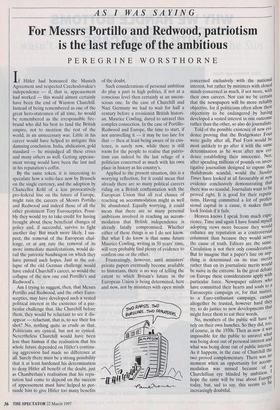AS I WAS SAYING
For Messrs Portal() and Redwood, patriotism is the last refuge of the ambitious
PEREGRINE WORSTHORNE
By the same token, it is interesting to speculate how a volte-face now by Brussels on the single currency, and the adoption by Chancellor Kohl of a less provocatively pro-federal line on the future of Europe, might ruin the careers of Messrs Portillo and Redwood and indeed those of all the other prominent Tory Eurosceptics. Possi- bly they would try to take credit for having brought about these beneficial changes of policy and, if successful, survive to fight another day. But much more likely, I sus- pect, the removal of the European chal- lenge, or at any rate the removal of its more immediate manifestations, would de- rail the patriotic bandwagon on which they have pinned such hopes. Just as the col- lapse of the old German challenge would have ended Churchill's career, so would the collapse of the new one end Portillo's and Redwood's.
Am I trying to suggest, then, that Messrs Portillo and Redwood, and the other Euro- sceptics, may have developed such a vested political interest in the existence of a par- ticular challenge that, like Churchill before them, they would be reluctant to see it dis- appear — reluctant, that is, to see their fox shot? No, nothing quite as crude as that. Politicians are cynical, but not so cynical. Nevertheless Churchill would have been less than human if the realisation that his whole future depended on Hitler's continu- ing aggression had made no difference at all. Surely there must be a strong possibility that it at least hardened his determination to deny Hitler all benefit of the doubt, just as Chamberlain's realisation that his repu- tation had come to depend on the success of appeasement. must have helped to per- suade him to give Hitler too many benefits of the doubt.
Such considerations of personal ambition do play a part in high politics, if not at a conscious level then certainly at an uncon- scious one. In the case of Churchill and Nazi Germany we had to wait for half a century before a revisionist British histori- an, Maurice Cowling, dared to unravel this complex connection. In the case of Portillo- Redwood and Europe, the time to start, if not unravelling it — it may be too late for that — then at least being aware of its exis- tence, is surely now, while there is still room for the people to realise that patrio- tism can indeed be the last refuge of a politician concerned as much with his own place in history as his country's.
Applied to the present situation, this is a worrying reflection, for it could mean that already there are so many political careers riding on a British confrpntation with the European Union that all real chance of reaching an accommodation might as well be abandoned. Equally worrying, it could mean that there are so many personal ambitions involved in reaching an accom- modation that British independence is already fatally compromised. Whether either of these things is so I do not know. But what I do know is that some future Maurice Cowling, writing in 50 years' time, will very probably find plenty of evidence to confirm one or the other.
Frustratingly, however, until ministers' private papers eventually become available to historians, there is no way of telling the extent to which Britain's future in the European Union is being determined, here and now, not by ministers with open minds concerned exclusively with the national interest, but rather by ministers with closed minds concerned as much, if not more, with their own careers. Nor can we be certain that the newspapers will be more reliably objective, for if politicians often allow their objectivity to be endangered by having developed a vested interest in one outcome rather than the other, so also do journalists.
Told of the possible existence of new evi- dence proving that the Bridgewater Four were guilty after all, Paul Foot would be most unlikely to go after it with the same determination as he went after new evi- dence establishing their innocence. Nor, after spending millions of pounds on inves- tigative journalism designed to expose the thalidomide scandal, would the Sunday Times have looked at all favourably at new evidence conclusively demonstrating that there was no scandal. Journalists want to be proved right. It is good for their reputa- tions. Having committed a lot of profes- sional capital in a cause, it makes them look foolish if it fails.
Heaven knows I speak from much expe- rience. Time and again I have found myself adopting views more because they would enhance my reputation as a controversial columnist than because they would serve the cause of truth. Editors are the same. Circulation is not their only consideration. But to imagine that a paper's line on any- thing is determined on its true merits rather than on its journalistic merits would be naive in the extreme. In the great debate on Europe these considerations apply with particular force. Newspaper editors who have committed their hearts and souls to a Eurosceptic campaign or, for that matter, to a Euro-enthusiast campaign, cannot altogether be trusted, however hard they try, to do justice to new developments that might force them to eat their words. No, members of the public will have to rely on their own hunches. So they did, too, of course, in the 1930s. Then as now it was impossible for the public to unravel what, was being done out of personal interest and what was being done out of public interest. As it happens, in the case of Churchill the two proved complementary. There was no moment when an opportunity for accom- modation was missed because of a, Churchillian eye blinded by ambition. 1 hope the same will be true about Europe today, but, sad to say, this seems to be increasingly doubtful.


































































 Previous page
Previous page